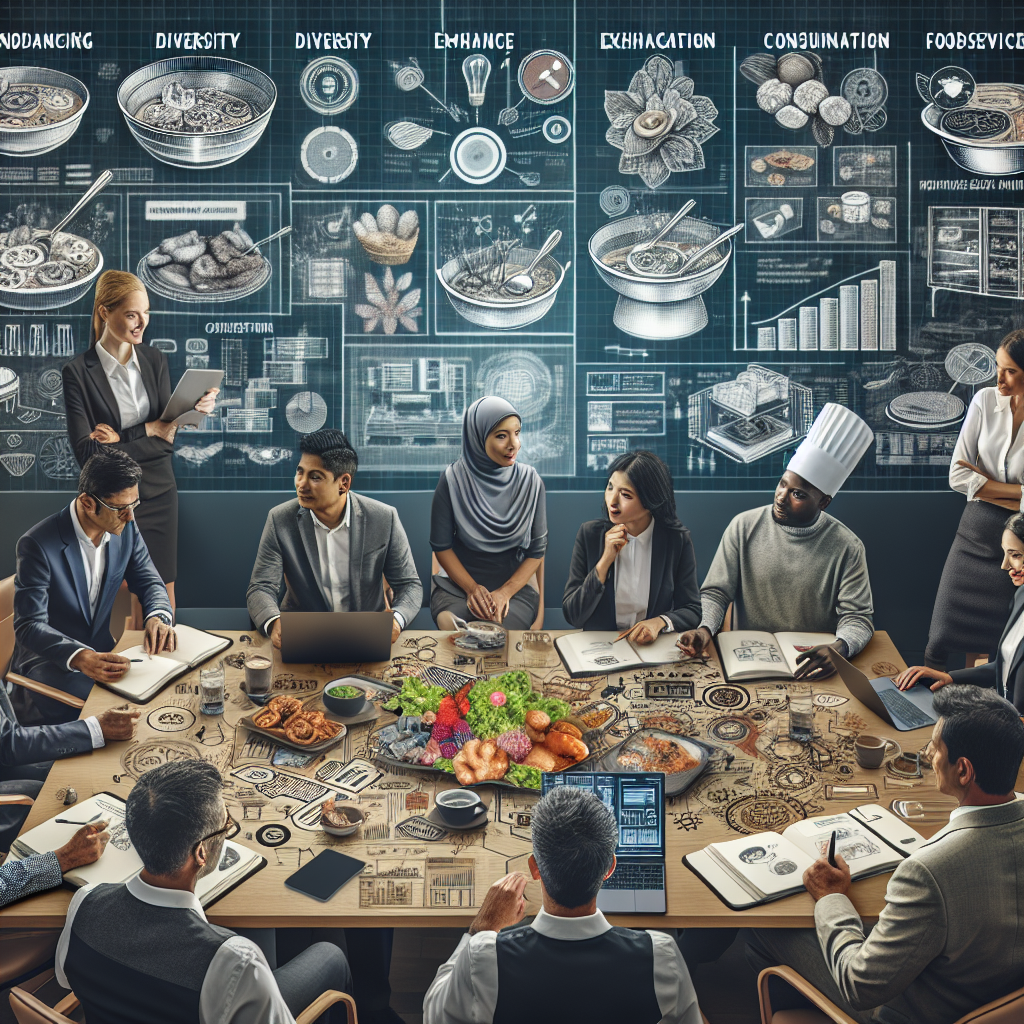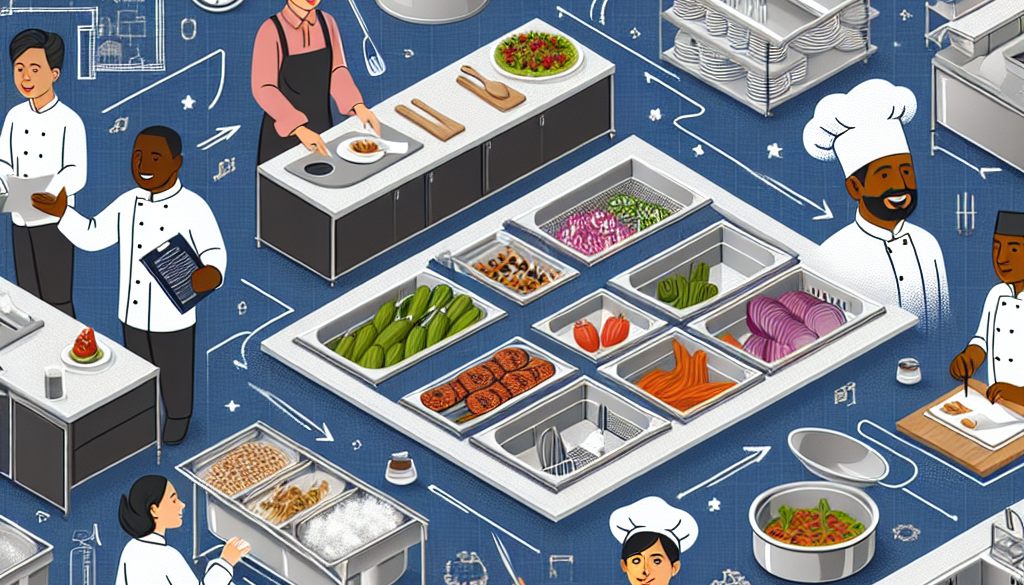Strategies for Enhanced Foodservice Design and Consulting
-
Table of Contents
- Foodservice Design and Consulting: Strategies for Success
- Understanding the Importance of Effective Foodservice Design
- Strategic Planning and Concept Development
- Maximizing Space Utilization
- Incorporating Technology for Enhanced Operations
- Emphasizing Sustainability in Design
- Creating an Engaging Customer Experience
- Adapting to Changing Market Trends
- Conclusion: Key Takeaways for Enhanced Foodservice Design
- Enhance Your Foodservice with ETprotein’s High-Quality Protein Products
Foodservice Design and Consulting: Strategies for Success

The foodservice industry is a dynamic and ever-evolving sector that demands innovation and efficiency. As consumer preferences shift and new challenges arise, foodservice design and consulting play a pivotal role in ensuring that restaurants, cafes, and other dining establishments not only meet but exceed customer expectations. This article delves into the strategies that can enhance foodservice design and consulting, providing valuable insights for industry professionals.
Understanding the Importance of Effective Foodservice Design
Before diving into the strategies, it’s crucial to understand why foodservice design is so important. A well-designed space can improve workflow, enhance customer experience, and ultimately contribute to the success of a foodservice business. According to a study by the National Restaurant Association, nearly 70% of customers say that a restaurant’s atmosphere influences their decision to return. This underscores the significance of thoughtful design in the foodservice industry.
Strategic Planning and Concept Development
The foundation of any successful foodservice design lies in strategic planning and concept development. This involves:
- Identifying the target market and understanding their preferences.
- Developing a unique concept that sets the establishment apart from competitors.
- Creating a detailed business plan that outlines the vision, mission, and financial projections.
By focusing on these elements, foodservice consultants can create a roadmap that guides the entire design process.
Maximizing Space Utilization
Efficient use of space is paramount in foodservice design. Consultants must consider both front-of-house and back-of-house requirements to ensure a seamless operation. This includes:
- Designing a kitchen layout that optimizes the flow of staff and materials.
- Creating dining areas that accommodate the desired number of guests without feeling cramped.
- Incorporating storage solutions that make the best use of available space.
By maximizing space utilization, foodservice establishments can improve efficiency and customer satisfaction.
Incorporating Technology for Enhanced Operations
Technology plays a crucial role in modern foodservice design. From point-of-sale systems to kitchen automation, integrating the latest technological advancements can streamline operations and improve the customer experience. For instance, self-service kiosks have been shown to reduce wait times and increase order accuracy, leading to higher customer satisfaction levels.
Emphasizing Sustainability in Design
Sustainability is no longer a trend but a necessity in the foodservice industry. Consumers are increasingly aware of environmental issues and expect businesses to take responsibility. Sustainable design can include:
- Using energy-efficient appliances and lighting.
- Incorporating materials with low environmental impact.
- Implementing waste reduction and recycling programs.
By prioritizing sustainability, foodservice businesses can reduce their carbon footprint and appeal to eco-conscious consumers.
Creating an Engaging Customer Experience
The customer experience is at the heart of foodservice design. Every aspect of the design should aim to engage and delight customers, from the ambiance to the service. This can be achieved by:
- Designing an inviting and comfortable atmosphere.
- Ensuring the layout facilitates smooth customer flow.
- Adding unique design elements that tell the brand’s story.
By focusing on the customer experience, foodservice establishments can create a memorable environment that encourages repeat visits.
Adapting to Changing Market Trends
The foodservice industry is subject to rapid changes in consumer behavior and market trends. Successful foodservice design and consulting must be adaptable, allowing for easy updates and modifications to the space. This could involve:
- Flexible seating arrangements to accommodate different group sizes.
- Modular design elements that can be updated without major renovations.
- Staying informed about emerging trends and consumer preferences.
By remaining adaptable, foodservice businesses can stay relevant and competitive in a changing market.
Conclusion: Key Takeaways for Enhanced Foodservice Design
In conclusion, enhanced foodservice design and consulting require a strategic approach that considers the customer experience, operational efficiency, and market trends. By focusing on strategic planning, space utilization, technology integration, sustainability, customer engagement, and adaptability, foodservice businesses can create spaces that are not only aesthetically pleasing but also highly functional and successful. Implementing these strategies will help ensure that foodservice establishments remain competitive and continue to thrive in an ever-changing industry.
Enhance Your Foodservice with ETprotein’s High-Quality Protein Products
As foodservice businesses strive for excellence in design and operations, incorporating high-quality ingredients is equally important. ETprotein offers a range of organic bulk vegan proteins and L-(+)-Ergothioneine (EGT) that can elevate your foodservice offerings. Their products are characterized by a neutral taste, non-GMO, allergen-free attributes, and high purity levels, making them an excellent choice for businesses looking to enhance their menu with nutritious and sustainable options.
About ETprotein:
ETprotein, a reputable protein and L-(+)-Ergothioneine (EGT) Chinese factory manufacturer and supplier, is renowned for producing, stocking, exporting, and delivering the highest quality organic bulk vegan proteins and L-(+)-Ergothioneine. They include Organic rice protein, clear rice protein, pea protein, clear pea protein, watermelon seed protein, pumpkin seed protein, sunflower seed protein, mung bean protein, peanut protein, and L-(+)-Ergothioneine EGT Pharmaceutical grade, L-(+)-Ergothioneine EGT food grade, L-(+)-Ergothioneine EGT cosmetic grade, L-(+)-Ergothioneine EGT reference grade and L-(+)-Ergothioneine EGT standard. Their offerings, characterized by a neutral taste, non-GMO, allergen-free attributes, with L-(+)-Ergothioneine purity over 98%, 99%, cater to a diverse range of industries. They serve nutraceutical, pharmaceutical, cosmeceutical, veterinary, as well as food and beverage finished product distributors, traders, and manufacturers across Europe, USA, Canada, Australia, Thailand, Japan, Korea, Brazil, and Chile, among others.
ETprotein specialization includes exporting and delivering tailor-made protein powder and finished nutritional supplements. Their extensive product range covers sectors like Food and Beverage, Sports Nutrition, Weight Management, Dietary Supplements, Health and Wellness Products, and Infant Formula, ensuring comprehensive solutions to meet all your protein needs.
As a trusted company by leading global food and beverage brands and Fortune 500 companies, ETprotein reinforces China’s reputation in the global arena. For more information or to sample their products, please contact them and email sales(at)ETprotein.com today.














